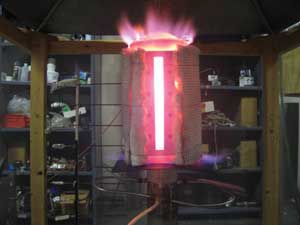Cummins Filtration, Diversified Energy utilize glycerin

August 8, 2008
BY Anna Austin
Two companies have recently introduced new solutions that utilize glycerin, a highly abundant biodiesel manufacturing byproduct.
Cummins Filtration Inc. has released a new heavy-duty engine antifreeze/coolant that is produced using a nontoxic glycerin base, which will replace traditionally used ethylene or propylene glycol. Mike Sarris, director of global coolants and chemicals for Cummins Filtration, said the impetus for the project was the growth of the biodiesel industry and therefore the increased supply of glycerin. "We wanted to utilize that material," he said. "So we started working with a very pure grade of glycerin several years ago to see if it was capable of serving as heavy-duty antifreeze." The environmentally friendly, trademarked Fleetguard ES Compleat Glycerin is the result of nearly two years of extensive testing.
Sarris said the company is currently accepting glycerin from multiple biodiesel facilities. The National Biodiesel Board recently awarded Cummins Filtration with an Eye on Innovation
Award to recognize the company's efforts in supporting biodiesel quality.
Diversified Energy Corp. announced July 1 the completion of demonstration tests on a glycerin combustion system, which ended a three-year research project. Jeff Hassannia, vice president of business development for Diversified Energy, said the prototype model testing had been ongoing for approximately one year. The system was developed by a team from North Carolina State University, led by William Roberts of the NCSU Department of Mechanical & Aerospace Engineering. The project resulted in the development of a prototype burner capable of efficiently and safely burning glycerin from biodiesel production. The prototype burner can process up to 100,000 British thermal units per hour.
The company said the system was designed to overcome glycerin safety and technical issues, such as high viscosity and a high auto-ignition temperature, by preheating the combustion chamber, maintaining heat retention, and maximizing radical retention while interacting air and fuel flows.
Diversified Energy expects the system to have a significant impact on the biodiesel industry. "We see this system as a means for the industry to enhance the value of the crude glycerin byproduct being generated today, and envision our system being retrofitted into existing facilities and designed for new facilities," Hassannia said. "As the economics are extremely challenging today, any system that can offer an economic benefit should be viewed favorably."
Hassannia said that based on the maturity of the technology, the combustion system could be commercially available within 12 months, once a commercialization partner is secured.
Cummins Filtration Inc. has released a new heavy-duty engine antifreeze/coolant that is produced using a nontoxic glycerin base, which will replace traditionally used ethylene or propylene glycol. Mike Sarris, director of global coolants and chemicals for Cummins Filtration, said the impetus for the project was the growth of the biodiesel industry and therefore the increased supply of glycerin. "We wanted to utilize that material," he said. "So we started working with a very pure grade of glycerin several years ago to see if it was capable of serving as heavy-duty antifreeze." The environmentally friendly, trademarked Fleetguard ES Compleat Glycerin is the result of nearly two years of extensive testing.
Sarris said the company is currently accepting glycerin from multiple biodiesel facilities. The National Biodiesel Board recently awarded Cummins Filtration with an Eye on Innovation
Award to recognize the company's efforts in supporting biodiesel quality.
Diversified Energy Corp. announced July 1 the completion of demonstration tests on a glycerin combustion system, which ended a three-year research project. Jeff Hassannia, vice president of business development for Diversified Energy, said the prototype model testing had been ongoing for approximately one year. The system was developed by a team from North Carolina State University, led by William Roberts of the NCSU Department of Mechanical & Aerospace Engineering. The project resulted in the development of a prototype burner capable of efficiently and safely burning glycerin from biodiesel production. The prototype burner can process up to 100,000 British thermal units per hour.
The company said the system was designed to overcome glycerin safety and technical issues, such as high viscosity and a high auto-ignition temperature, by preheating the combustion chamber, maintaining heat retention, and maximizing radical retention while interacting air and fuel flows.
Diversified Energy expects the system to have a significant impact on the biodiesel industry. "We see this system as a means for the industry to enhance the value of the crude glycerin byproduct being generated today, and envision our system being retrofitted into existing facilities and designed for new facilities," Hassannia said. "As the economics are extremely challenging today, any system that can offer an economic benefit should be viewed favorably."
Hassannia said that based on the maturity of the technology, the combustion system could be commercially available within 12 months, once a commercialization partner is secured.
Advertisement
Advertisement
Advertisement
Advertisement
Upcoming Events





